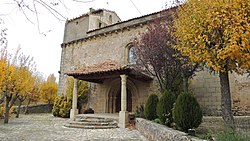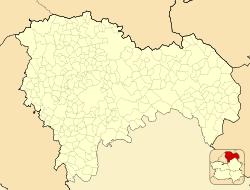This article needs additional citations for verification .(May 2024) |
Luzaga, Spain | |
|---|---|
 Romanesque church in Luzaga | |
| Coordinates: 40°58′28″N2°26′39″W / 40.97444°N 2.44417°W | |
| Country | |
| Autonomous community | Castile-La Mancha |
| Province | Guadalajara |
| Municipality | Luzaga |
| Area | |
• Total | 29.70 km2 (11.47 sq mi) |
| Elevation | 1,072 m (3,517 ft) |
| Population (2024-01-01) [1] | |
• Total | 68 |
| • Density | 2.3/km2 (5.9/sq mi) |
| Time zone | UTC+1 (CET) |
| • Summer (DST) | UTC+2 (CEST) |
Luzaga is a village and municipality in the province of Guadalajara, Spain, part of the autonomous community of Castile-La Mancha. Luzaga's Bronze, one of the most significant known examples of Celtiberian script, was found here.



